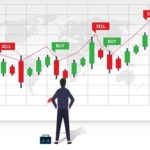Difference between Investors and Traders
In this article, we will understand the key differences between investors and traders.
Some of you might ask…..isn’t the difference obvious? What’s there to talk about?
Well, it’s not that simple.
The stock market makes people do strange things… Investors start acting like traders and traders start thinking like investors- even without realizing.
The reality is that investing and trading require completely different mindsets.
So..let’s understand the key aspects on which investing and trading are different.
First are the objectives. The reasons why they are in the stock market
Investors come to the stock market for generating wealth for their families, sending kids to college or preparing for retirement.
Traders come to the stock market for generating a primary or secondary source of income. And those traders who try to get rich overnight have a tough time staying in the market.
Next comes the time frame
An investor looks for long-term growth in the stock. His objective is to find quality stocks at great valuations and he is willing to stay in the stock for as long as the fundamentals are intact. It is not unusual for investors to hold certain stocks for 5, 10 or even 20 years.
A trader, on the other hand, is rather short-term oriented. His objective is to look for opportunities that he can capitalize on in the next month or next week or even the next few seconds.
Let’s talk about the skill required to win the game
Investors need to eat, breathe and live on fundamental analysis- which is an analysis of everything from the growth potential of the company, competitive standing in the sector… to the softer aspects such as management quality.
Traders, on the other hand, primarily depend on Technical analysis to identify patterns, supports and resistance and trends that are driving the price action. Idea is to get into the action early on and ride the wave as far as you could.
Next comes the effort involved in these two
Here, investors get some relaxation because the fundamentals of the companies don’t change overnight and nor do the macroeconomic factors. Even the earnings results are announced only once a quarter. So, it is easy for investors to catch up.
Traders, on the other hand, have to stay on top of a lot of information in a very short amount of time. They have to keep track of global cues, major news flow, upcoming events like elections or RBI announcements and of course, the quarterly earnings. Therefore, trading needs much more effort than investing.
The next consideration is leverage
Leverage is the ability to take trades bigger than your capital.
Investors typically don’t have the luxury of taking leverage and frankly, it is in their best interest not to take leverage.
Traders, on the other hand, need leverage to increase their income potential. Leverage can be given by the broker or by trading leveraged products such as futures and options. Leverage can be a blessing or a curse and it depends entirely on the skill of the trader.
Now..what about the tax implications?
Well, investors get much more favourable treatment when it comes to long term investment. LTCG is at 10% as of now.
Whereas traders are beaten down black and blue in the form of STT, brokerages, and a host of other charges. In India, it is expensive to be a trader.
Let’s talk about stock selection
Investors select stocks based on their value and growth prospects whereas traders select stocks based on momentum, liquidity and trends. Noticeable among these is liquidity because an investor can buy shares of an extremely illiquid stock based on its growth prospects whereas a good trader will never touch such an illiquid stock.
Next, comes the direction of trade
Investors can trade in only one side- the long side. Meaning, that they can only buy the shares and wait until the shares appreciate.
A trader, on the other hand, is ambidextrous. He can make money taking long trades and he can make money by shorting trades. This is by far the greatest advantage of being a trader.
Last but not least is the emotional intelligence
The most important emotional intelligence attribute of a successful investor is patience. He has tons of them. He is not bothered by the short-term volatility of the market. As long as the fundamentals of the company are strong he has no intention of selling his shares.
Traders need a different kind of emotional intelligence. They should be able to make quick decisions under pressure. They should also be mature enough not to shuttle between the extreme emotions of greed and fear. Further, they should have a probabilistic mindset, which means they should be comfortable dealing with uncertainties and embrace models such as design thinking in trading.
Howdy!
If you’re here for the first time, let’s get introduced.
VRD Nation is India’s premier stock market training institute and we (Team VRD Nation) are passionate about teaching each and every aspect of investing and trading.
If you’re here for the first time, don’t forget to check out “Free Training” section where we have tons of free videos and articles to kick start your stock market journey.
Also, we got two awesome YouTube channels where you can continue the learning process.
Must-Read Articles
Difference between Investors and Traders
In this article, we will understand the key differences between investors and traders.
Some of you might ask…..isn’t the difference obvious? What’s there to talk about?
Well, it’s not that simple.
The stock market makes people do strange things… Investors start acting like traders and traders start thinking like investors- even without realizing.
The reality is that investing and trading require completely different mindsets.
So..let’s understand the key aspects on which investing and trading are different.
First are the objectives. The reasons why they are in the stock market
Investors come to the stock market for generating wealth for their families, sending kids to college or preparing for retirement.
Traders come to the stock market for generating a primary or secondary source of income. And those traders who try to get rich overnight have a tough time staying in the market.
Next comes the time frame
An investor looks for long-term growth in the stock. His objective is to find quality stocks at great valuations and he is willing to stay in the stock for as long as the fundamentals are intact. It is not unusual for investors to hold certain stocks for 5, 10 or even 20 years.
A trader, on the other hand, is rather short-term oriented. His objective is to look for opportunities that he can capitalize on in the next month or next week or even the next few seconds.
Let’s talk about the skill required to win the game
Investors need to eat, breathe and live on fundamental analysis- which is an analysis of everything from the growth potential of the company, competitive standing in the sector… to the softer aspects such as management quality.
Traders, on the other hand, primarily depend on Technical analysis to identify patterns, supports and resistance and trends that are driving the price action. Idea is to get into the action early on and ride the wave as far as you could.
Next comes the effort involved in these two
Here, investors get some relaxation because the fundamentals of the companies don’t change overnight and nor do the macroeconomic factors. Even the earnings results are announced only once a quarter. So, it is easy for investors to catch up.
Traders, on the other hand, have to stay on top of a lot of information in a very short amount of time. They have to keep track of global cues, major news flow, upcoming events like elections or RBI announcements and of course, the quarterly earnings. Therefore, trading needs much more effort than investing.
The next consideration is leverage
Leverage is the ability to take trades bigger than your capital.
Investors typically don’t have the luxury of taking leverage and frankly, it is in their best interest not to take leverage.
Traders, on the other hand, need leverage to increase their income potential. Leverage can be given by the broker or by trading leveraged products such as futures and options. Leverage can be a blessing or a curse and it depends entirely on the skill of the trader.
Now..what about the tax implications?
Well, investors get much more favourable treatment when it comes to long term investment. LTCG is at 10% as of now.
Whereas traders are beaten down black and blue in the form of STT, brokerages, and a host of other charges. In India, it is expensive to be a trader.
Let’s talk about stock selection
Investors select stocks based on their value and growth prospects whereas traders select stocks based on momentum, liquidity and trends. Noticeable among these is liquidity because an investor can buy shares of an extremely illiquid stock based on its growth prospects whereas a good trader will never touch such an illiquid stock.
Next, comes the direction of trade
Investors can trade in only one side- the long side. Meaning, that they can only buy the shares and wait until the shares appreciate.
A trader, on the other hand, is ambidextrous. He can make money taking long trades and he can make money by shorting trades. This is by far the greatest advantage of being a trader.
Last but not least is the emotional intelligence
The most important emotional intelligence attribute of a successful investor is patience. He has tons of them. He is not bothered by the short-term volatility of the market. As long as the fundamentals of the company are strong he has no intention of selling his shares.
Traders need a different kind of emotional intelligence. They should be able to make quick decisions under pressure. They should also be mature enough not to shuttle between the extreme emotions of greed and fear. Further, they should have a probabilistic mindset, which means they should be comfortable dealing with uncertainties and embrace models such as design thinking in trading.















![What is Virtual Contract Note [Zerodha]](https://www.vrdnation.com/wp-content/uploads/2023/10/maxresdefault-virtual-note-500x383.jpg)



Leave A Comment